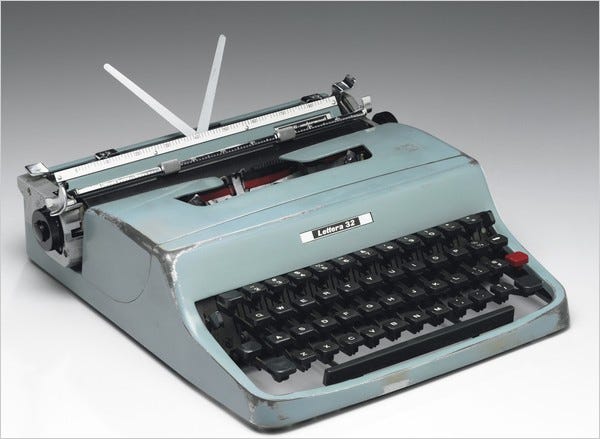Chris Moon is a serial hobbyist living in San Francisco. When he’s not scrubbing typebars, he is sharpening jack planes, pickling nukazuke, rebuilding a shutter curtain, or solving for zero-days.
Chris here. When I write, I often experience a sudden feeling of creator's doubt. After gleefully allowing my stream of consciousness to flow, relishing the momentum of it all, I will then sometimes within mere minutes question the work, the stark obviousness of my thoughts. Gone is my initial desire to accept, with gratitude, my creative act. I instead begin to mentally compare it to all creative acts, and I smother that gratitude with judgment.

But I’ve found a way to counteract this cycle: with a typewriter. When you’re laying down an indelible mark of analog truth, with no Ctrl+Z, you have to accept what is being written, at the very moment in which it is all slugged out.
Why is this interesting?
It is tempting to mock typewriters. Once a symbol of modern empowerment and productivity, they can now appear twee in their outmoded laboring. And yet for some reason, the marketplace still abounds with analog simulacrum, pushing smart pencils, dumb tablets, e-ink and paperwhites, all of which seem to be in agreement that there’s something not quite right with an internet-enabled laptop when it comes to helping a writer finally feel some relief from doubt and distraction.
WITI Classifieds:
We are running some weekly classifieds in WITI again. If you’re interested in running an ad, you can purchase one through this form. If you have any questions, don’t hesitate to drop a line.
Where did Cormac McCarthy publish the ONLY non-fiction piece of his career? Nautilus. A science newsletter where intellectualism thrives. Sign up for free
—
For me, typewriters offer opportunities for deeper focus, an acceptance of imperfection, and a sense of measurable progress. I’m not alone: there remains a community of writers who continue to use them in their creative processes. As the Sydney Morning Herald put it in 1986, a “noisy minority, still banging away.”
This is not an appeal to superiority via analog virtue alone, à la vinyl records and film photography. The output is at times smudgy, often crooked, and in my case, horribly misspelled. But typewriters do provide an uncompressed, unadorned recording of authorship. Fonts are pre-chosen. Sizes are static. Color, only when necessary. Emojis, old fashioned ;) They completely eschew the need for printers. Ink? Dirt cheap. Autosave? Always on. Battery life? Decades. Resolution? As good as your prescription. Backspace? A volley of X’s. Cost? Often free. The number 1? A lowercase letter L. Dedicated cent and fraction keys? But of course. Exclamation point? Apostrophe, backspace, period.
If not abused, they require nearly no routine maintenance, outside of a burst of compressed air and a toothbrush soaked in lighter fluid. There is a sensory delight, an instant gratification, to seeing one's thoughts and statements clattered out with raucous punches, ratcheting pawls, and ringing bells. Like a personal parade celebrating the progression of paragraphs as they round the corner.
So personal are these muses that authors have at times thanked their typewriters in awards acceptance speeches. Or proclaimed them to be their most desired desert island companions, or produced an entire documentary on the subject. Cormac McCarthy’s lone Olivetti Lettera 32, on which he wrote all his novels, would fetch a quarter million dollars at auction—nearly ten times what experts at Christie’s had predicted. It stands, worn and stoic, like a manifest totem from the mind of McCarthy himself. (CM)
—
Thanks for reading,
Noah (NRB) & Colin (CJN) & Chris (CM)
Why is this interesting? is a daily email from Noah Brier & Colin Nagy (and friends!) with editing help from Louis Cheslaw about interesting things. If you’ve enjoyed this edition, please consider forwarding it to a friend. If you’re reading it for the first time, consider subscribing.




I loved this piece.
I’ve found the Freewrite Traveler a good proxy for a typewriter - really more of a word processor with editing abilities but with enough friction to make it less likely to do all the time - to induce forward drafting with editing saved for later. My inner critic is an asshole and this makes it harder for him to stop me mid-thought.